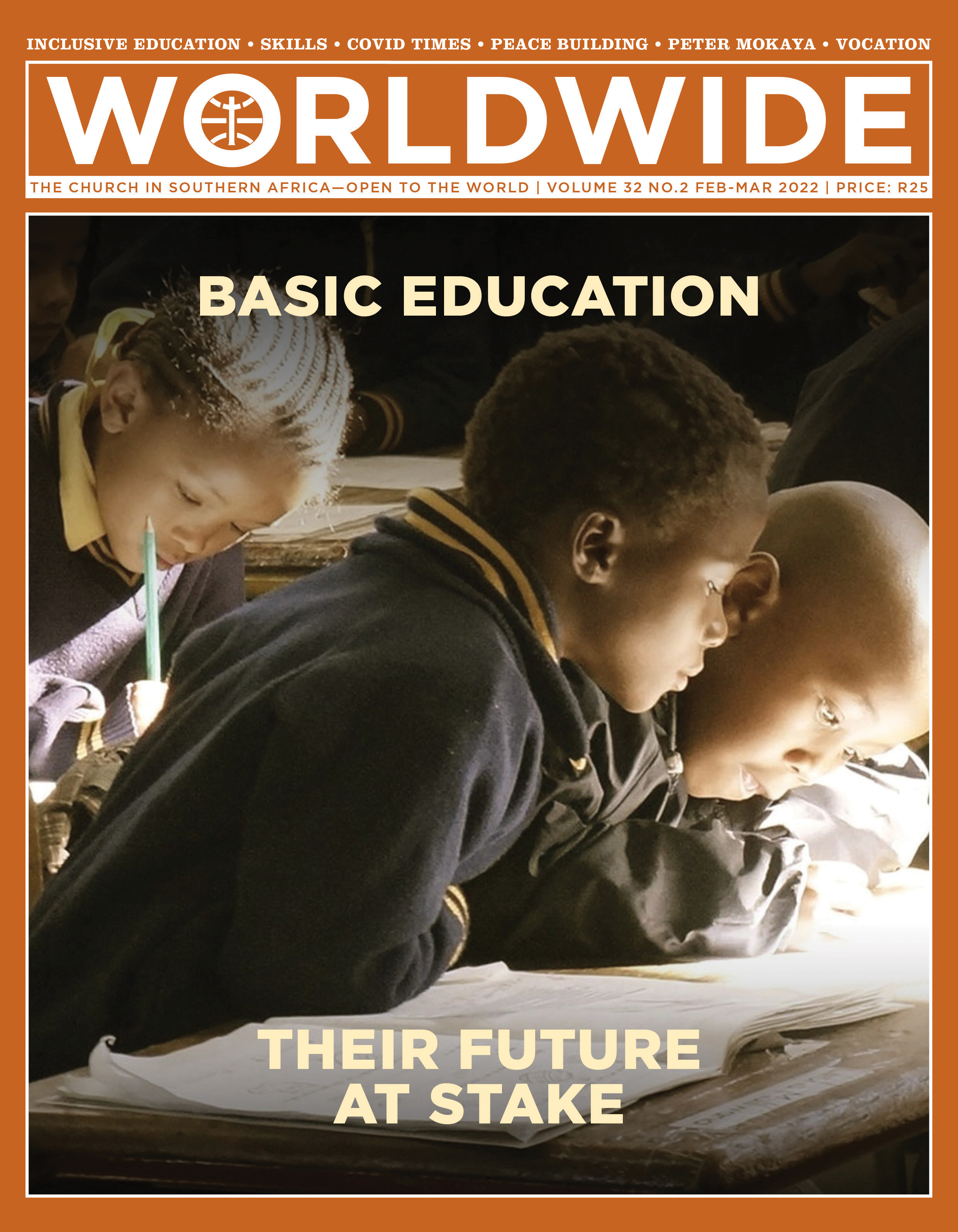
Basic Education Their Future At Stake
The front cover picture was certainly not taken during Covid times. We do not know its exact location, but it could be from any particular school in rural South Africa. What indeed the image of these children reflects is their eagerness for learning and doing it together. Their minds are surely full of dreams; their desires for a bright future cannot be frustrated. The task of offering them an inclusive and integral quality education can look gigantic, but each one’s contribution can make the miracle happen.
SPECIAL REPORT • EDUCATION IN COVID-19
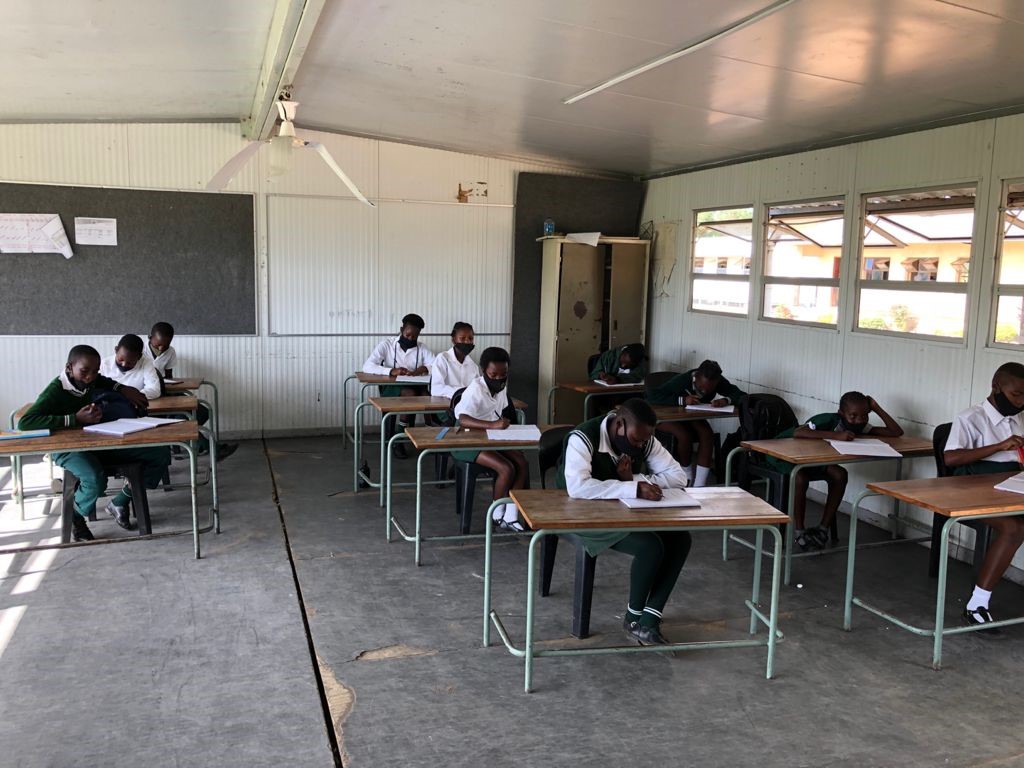
Impact of Covid-19 on Children at School
The pandemic opened bare the injustices and inequalities in South Africa, particularly in the education system. One of the teachers from the rural area shares some of the various existing challenges in this field
BY Nikiwe Gift Ndlovu | Teacher at Khahlela Primary School, Mpumalanga
COVID-19 has been a devastating time for learners who, according to estimates, lost more than a year of tuition. Rotational attendance, days off, and occasional closures have brought anxiety and loss of interest in studies among most learners, especially in public and rural schools, leading to higher dropout rates. The availability of digital learning equipment, infrastructure and connectivity remains a big challenge and has hindered online learning during the pandemic. The gap between the poor and the wealthy has, therefore, widened even more during the last months.
Teachers have been unable to complete their curricula, leaving knowledge, as well as other gaps, which might bring about long-lasting implications, affecting not only education but also the labour sector, the economy of the country, and the future earnings of the learners.
Use of information and communications technology (ICT)
One of the greatest challenges exposed by the pandemic is the lack of ICT infrastructure in remote rural schools. Most of the learners come from poor backgrounds. In urban and private schools, children continued their tuition through various ICT platforms, such as Zoom, WhatsApp, Microsft Teams but those in remote rural schools were unable to do so, due to lack of resources, both at school and at home. The government failed to prioritize equal education for all learners, successfully integrate ICT in schools and transform the education sector. These factors contributed greatly to the interruption of ongoing education during the pandemic.
Covid-19 has been a devastating time for learners who, according to estimates, lost more than a year of tuition
These ineffective attempts include Operation Phakisa Education (OPE) which comprises aspects such as connectivity, availability of devices, teacher training and development, digital content development, distribution and e-administration. Since the launching of the programme in 2015, rural schools have still not been connected and very few schools have got enough devices for their needs. Moreover, the department of education has not been able to make proper use of these devices since teachers have not been trained to use them.
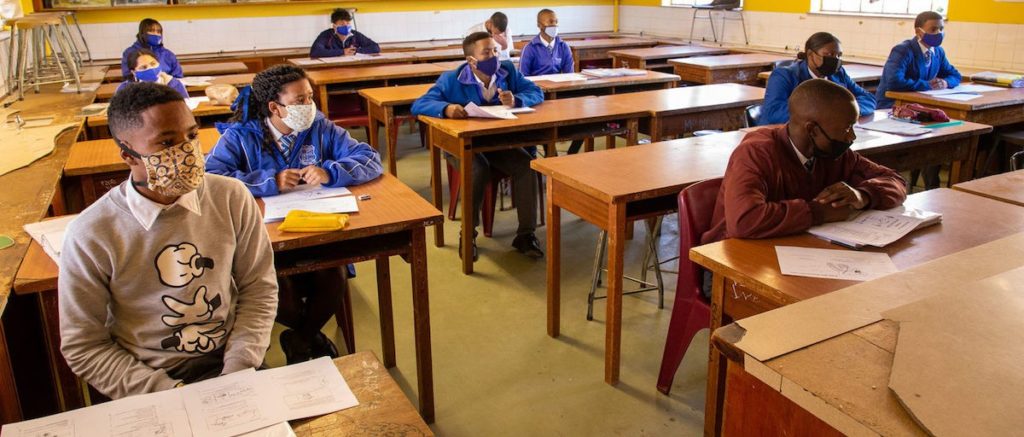
Overcrowding
Most of our public schools are overcrowded. In Covid times, in order to practise social distancing, learners had to rotate or take turns when going to school, either by days or weeks. This made them fall behind in their schoolwork and it will be difficult to catch up with the lost content. The department of education is trying to make up for this knowledge gap by grading curriculum content to be taught, a kind of a ‘catch up’ programme, done through the National Education Collaboration Trust (NECT). The NECT is a body that brings together different groups of people interested in education and committed to work collaboratively to improve education. The NECT has prepared the revised recovery curriculum and assessment planner and tracker for 2022. They are available on the NECT website (nect.org.za)
One of the greatest challenges exposed by the pandemic is lack of ICT infrastructure in remote rural schools
Nutrition programme
According to UNICEF and Stats South Africa’s 2020 report, Child poverty in South Africa: a multiple overlapping deprivation analysis, 62% of children in South Africa live in poverty, especially in rural areas. These children depend on the School Nutrition Programme (SNP) for their sustenance. The sporadic closure of schools and the Early Childhood Development Centres meant that many children missed their meals, leading to an increase in child hunger which may have a lasting effect on their development.
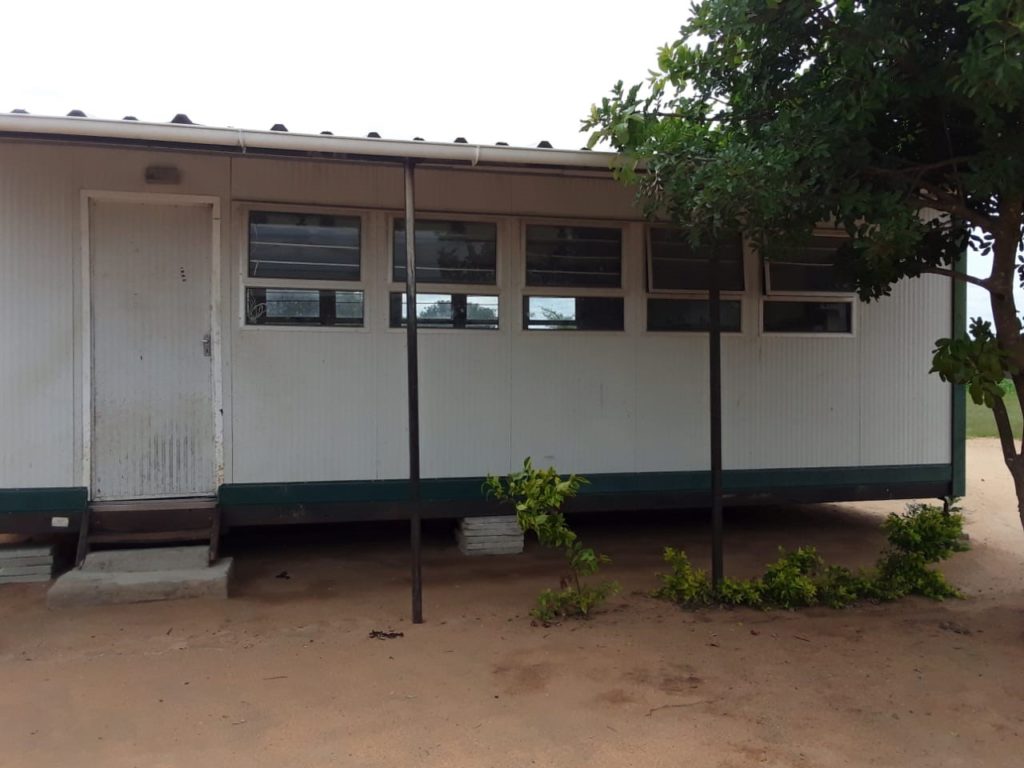
hot in summer and cold in winter. Credit: Nikiwe Gift Ndlovu.
Infrastructure
Schools in remote rural areas do not have adequate infrastructure to accommodate learners under normal circumstances. The sanitation in most schools is not hygienic with some of them still using pit toilets. This is a danger to learners and not hygienic in the slightest. During the COVID-19 pandemic, social distancing among learners was impossible to implement, as there were not enough classes available. Learners were also unable to continuously wash their hands, due to lack of water in most of these schools. This lack of infrastructure caused learners and teachers to stay at home in order to prevent contracting the virus, interrupting therefore the normal class programme.
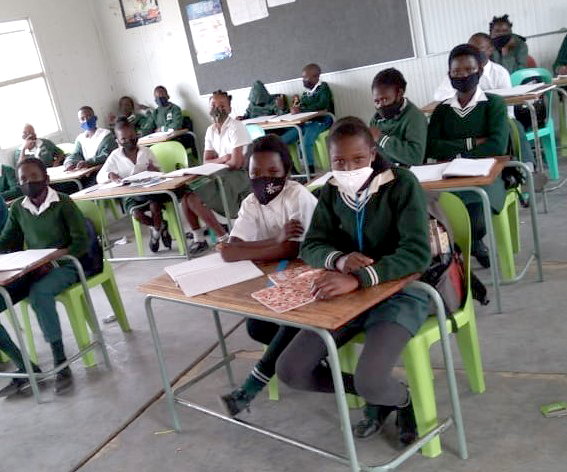
to maintain proper social distancing. Credit: Nikiwe Gift Ndlovu.
Bullying and sexual abuse
Bullying remains a big challenge in our schools to date. Although in most instances it is the boys who bully girls, there are instances done among boys, girls, or girls to boys. Boys usually view themselves as entitled to abuse girls; they think that they can do whatever they want to girls, including sexual harassment, such as touching a girl inappropriately, even when the girl protests.
Bullying can be reduced significantly at schools and in communities if parents, teachers and the department of education work together to prevent it, rather than reacting to incidents. School rules and policies, if well implemented, have the power to reduce bullying; parent-teacher collaboration and communication can also be of help. There is a need for teaching children to respect each other from a young age. The manner of discipline given to a child at home and at school contributes to bullying. If parents and teachers continue using corporal punishment they perpetuate bullying tendencies— ‘if my mother, my father, my teacher can beat me, then it’s ok for me to beat you’.
62% of children in South Africa live in poverty, especially in rural areas
Life at home is seen as a modelling behaviour that leads to these feelings of entitlement. Children observe their fathers harassing their mothers and witness emotional, economical, physical, verbal, as well as other various forms of abuse. They see such behaviour as normal, even when it is not. The department of education has introduced life skills programmes at schools to fight such social ills. Children are encouraged to have buddy groups where they learn to take care of each other, respect each other and to avoid violence at all costs. The life skills programme, a good initiative, is linked to the school nutrition programme to ensure that all learners get food. Gardening is part of it and aims at supplementing the learners’ diet and assisting those who have no food at home. Poor and vulnerable children are identified and supported if needed. Even if these initiatives are well intended, they lack efficient monitoring and evaluation, leading to some schools not following the valuable and beneficial programme designed for their learners.
Teenage pregnancy
pregnancy during Covid-19, especially in secondary schools. The escalating rate of teenage pregnancy is caused, among other reasons, by children not regularly going to school, parents working until late at night, leaving their teenagers unattended, pressure of getting a child in order to access to a social grant, child-headed families and other social problems. Teenagers who have remained at home have been exposed to sexual predatory elders, taking advantage of them and impregnating them. Poverty contributes to high teenage pregnancy rates creating situations where children find themselves in sexual relationships with adults for money— ‘sugar daddies’.
School dropout rates
The pandemic has also led to an increase in the dropout rate among learners. This can be attributed to the continued closure of schools, demoralization of both learners and teachers, lack of support in their studies from family members, among other reasons. Another great contributing factor has been that young learners have become heads of households because of the death of their parents and elders due to the Corona virus.
Poverty contributes to high teenage pregnancy rates. Children find themselves in sexual relationships with adults for money—‘sugar daddies’
Inclusive education
The inclusion of those learners experiencing barriers remains a challenge. The South African government has signed into policy the Education Whitepaper 6 (EPW6 2001) on Special Needs of Education. This ensures equal access to education for all learners, including those with disabilities or experiencing any kind of disadvantage—economic, social, language, class, behaviour or any other barrier. However, this policy is only effective in principle and the department is not doing enough on its implementation. Teachers have not been trained to accommodate those with learning barriers in their normal classroom environment. Therefore, they drop out of school and those with various disabilities stay at home, since they are not accepted in normal schools. Their parents are, at times, unaware that their disabled children should be accommodated and some teachers do not have information either, as far as inclusive education is concerned.
For example, learners with hearing impairment tend to be left behind in remote rural schools, since teachers have not been trained in sign language. A new Education Amendment Bill—still in Parliament for approval—has as one of its key aspects, the inclusion of sign language in tuition. Introducing sign language into schools will allow more learners with hearing difficulties to get quality education. The Amendment Bill will also bring some changes regarding compulsory schooling, language, code of conduct, drugs and alcohol initiation and corporal punishment.
The training of newly graduated teachers has also been deficient, not equipping them to face the challenges that new technologies bring along—particularly the use of ICT, implementation of online learning, coding and other novel trends in education. Currently, the department of basic education is piloting the introduction of robotics and coding in classes of Grades R to 3. What is surprising is that the number of teachers being trained for that purpose is insufficient.
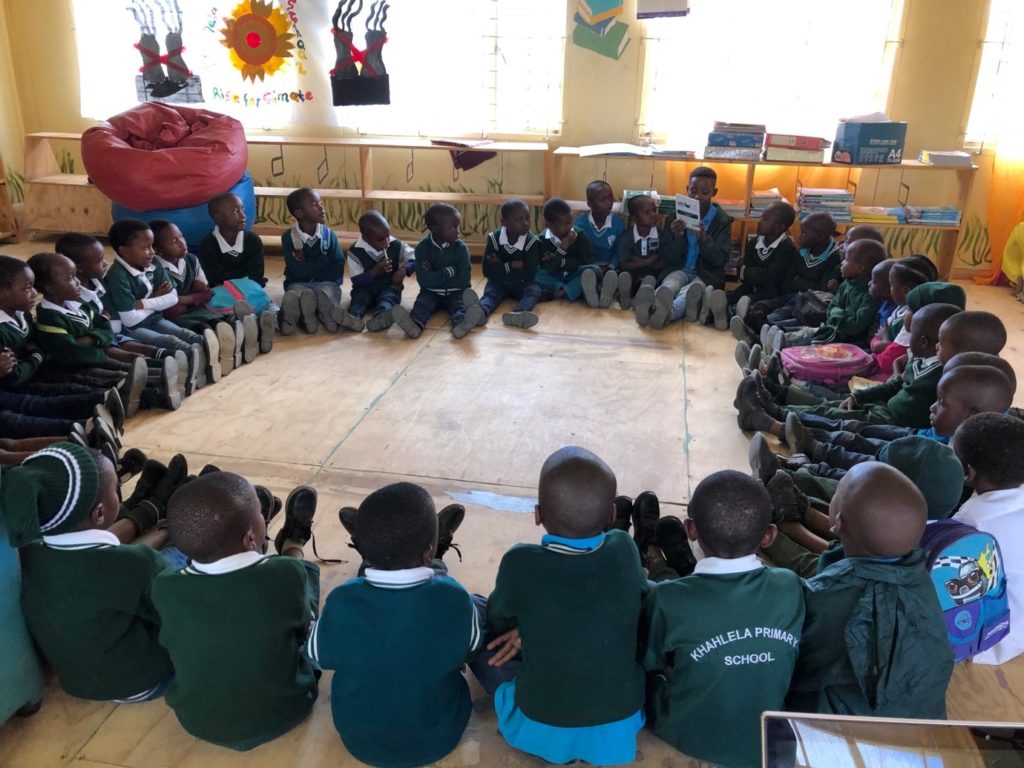
Family background and education
in education. Children who grow up in wealthy families, with higher education backgrounds, are more likely to be better educated than those from poor and illiterate households. Children in wealthy environments are motivated by their economic status; books and educational resources are easily available for them, while kids from poorer environments struggle with nearly everything: books, uniforms, food, transport and, in some cases, parental support. Those from poor households are also not so much motivated in learning since they generally have no role model or someone to look up to.
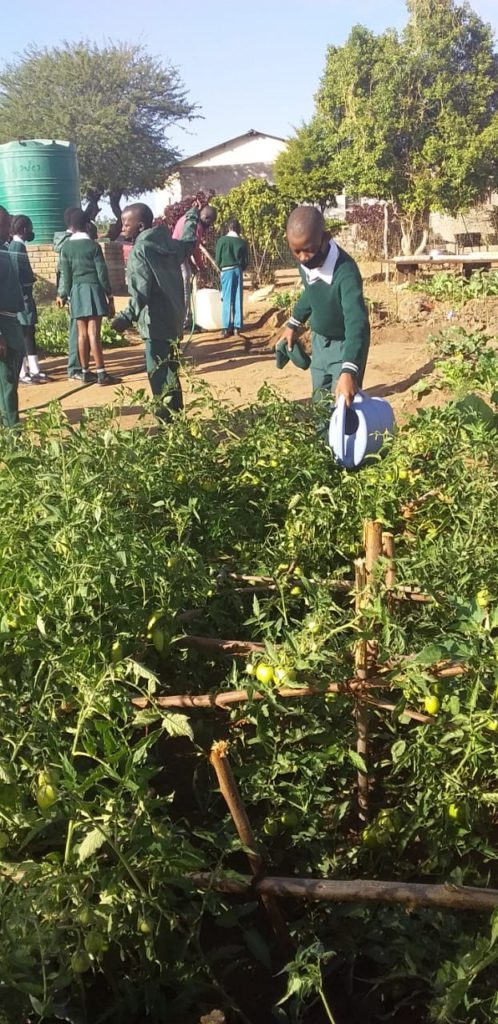
Credit: Nikiwe Gift Ndlovu.
Single parenting has both negative and positive influences on education. Some single parents can be very committed and focused on the education of their children. However, in general, children of families with both parents tend to learn better. They have the support of father and mother and greater assistance at home than those in a single parent setting. In some situations, single parents spend most of their time at work, leaving their children unattended with no one to assist them in their schoolwork. Some working parents compensate their absence with aftercare so that their children can be helped with their homework, but in poor families and communities, this is not possible.
This time of the pandemic should be seen as an opportunity to accelerate the fight against inequality, especially in the education sector
The Covid-19 pandemic has shown clearly the education inequalities that exist in South Africa, caused, among other factors by social, gender, wealth and racial inequalities. This time of the pandemic should be seen as an opportunity to accelerate the fight against inequality, especially in the education sector. It could be seen as an occasion for renewal and re-dedication to address social evils, such as the neglect of the poor and those living in rural areas. Resources need to be redirected to improve their education. It is unacceptable that in South Africa today, we still have pit toilets in our schools, metal containers as classes, a high number of schools without ICT infrastructure and other lack of needed resources. The Church has been a frontrunner in providing quality education. Good partnership between the Church, the private sector and the government can yield greater results in fighting these challenges. As Nelson Mandela once said: “Education is the most powerful weapon which you can use to change the world”. It is the responsibility of each nation to provide equal education to its children today, so that tomorrow they will be able to fight poverty, inequality, injustices and to build a better society.
| Dates To Remember |
|
February 1 – Blessed Benedict Daswa 2 – World Day of Prayer for Consecrated Life 4 – International Day of Human Fraternity 6 – International Day of Zero Tolerance of Female Genital Mutilation 8 – International Day of Prayer and Awareness against Human Trafficking 11 – International Day of Women and Girls in Science 11 – World Day of the Sick 13 – World Radio Day 20 – World Day of Social Justice 21 – International Mother Language Day March 1 – Zero Discrimination Day 2 – Ash Wednesday 3 – World Wildlife Day 8 – International Women’s Day 15 – St Daniel Comboni’s Birthday 20 – International Day of Happiness 21 – International Day for the Elimination of Racial Discrimination 21 – SA Human Rights Day 22 – World Water Day 24 – World Tuberculosis Day 24 – International Day for the Right to the Truth concerning Gross Human Rights Violations and for the Dignity of Victims 25 – International Day of Remembrance of the Victims of Slavery and the Transatlantic Slave Trade |
